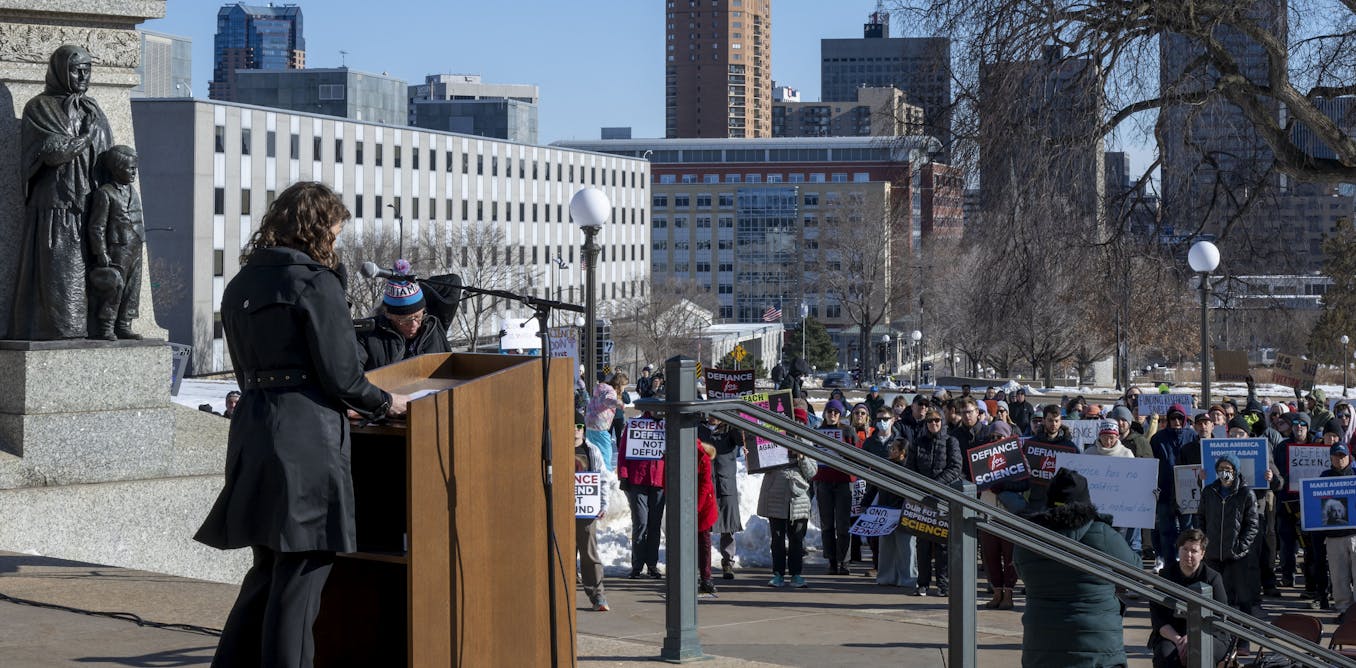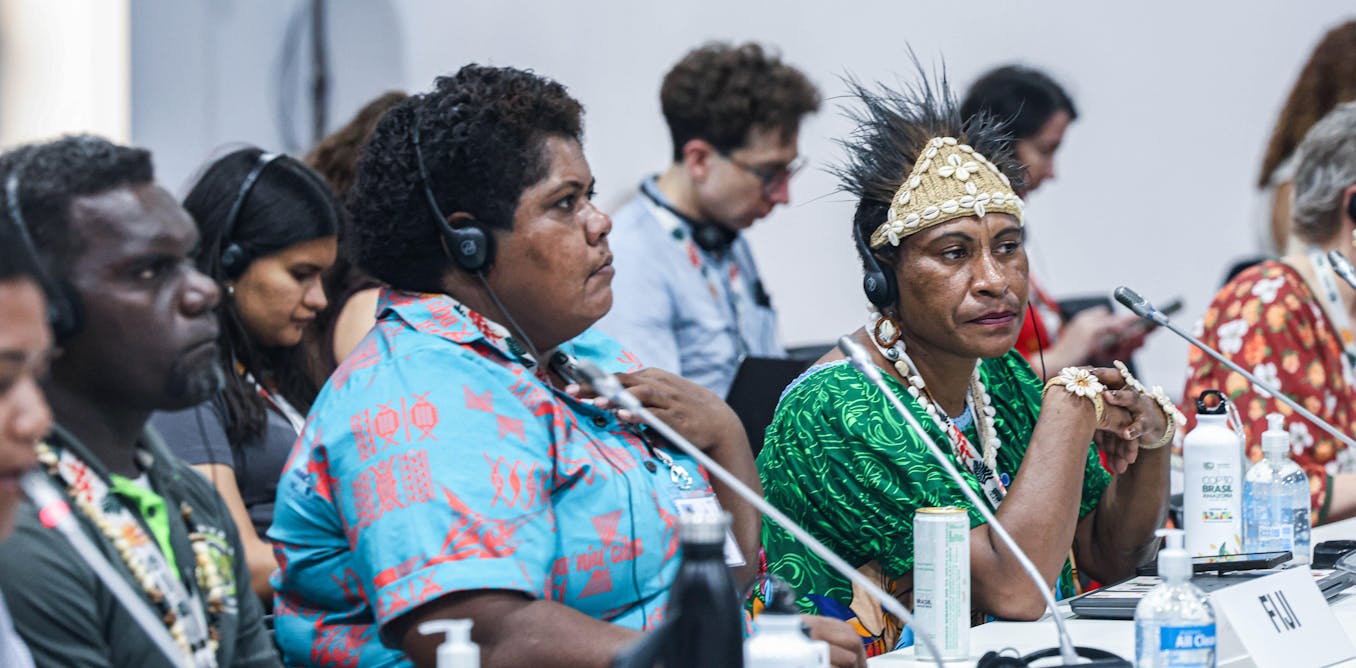Racism in medicine | DW Documentary
More than a quarter of the population of Germany has a migrant background. Many report that they have received substandard care from doctors and hospitals. Is the healthcare system afflicted by racism?
This documentary hears from people who’ve been turned away or received inadequate care in a medical emergency; from midwives who report on racism in the delivery room; from students who criticize teaching according to white norms; as well as from doctors who reflect on the problem.
The film shows just how dangerous conscious or unconscious racism in the healthcare sector can be. Its findings are based on the results of the first representative study on the issue in Germany, published in November 2023 by the German Centre for Integration and Migration Research.
The fact is: Even today, the term ‘Morbus Mediterraneus’ still circulates in the healthcare sector, which is intended to describe “exaggerated suffering in southerners”. Standard medical equipment doesn’t always function reliably when used on dark-skinned patients. And many doctors have never learned that some diseases can be diagnosed differently depending on whether the person is Black or White. The medical norm, even in textbooks, is still the white, western European patient. This can result in misdiagnosis and the serious worsening of symptoms.
Take the case of Remziye T. from Lower Saxony: Her infected heart valve went undiscovered for a long time because doctors didn’t take her pain seriously enough. When the problem was eventually correctly diagnosed, it was too late for medical treatment. Now Remziye T. has to live with a mechanical heart valve: the operation has left her unable to walk properly and she is no longer able to work.
Dr. Bismarck Ofori allowed the camera team to film in his Hanover surgery. Many of the patients who attend the Black doctor’s practice have a migrant background. They tell him they’ve not been taken seriously in other surgeries; some of them were even brusquely turned away. In Ofori’s treatment room, it’s evident that careful diagnosis and overcoming language barriers in the process costs time and money. Not that language is the only obstacle to making a correct diagnosis. The pulse oximeter, for example, a device used to measure the blood’s oxygen content, can be less accurate when used on patients with darker skin. But this is not systematically taught at medical school.
The healthcare system is only just beginning to unpack the issue of racism and its impact. But many doctors, medical students, midwives and a medical historian have spoken out – addressing a problem that, in the worst-case scenario, can have fatal consequences.
#documentary #dwdocumentary
______
DW Documentary (English): https://www.youtube.com/dwdocumentary
DW Documental (Spanish): https://www.youtube.com/dwdocumental
DW Documentary وثائقية دي دبليو (Arabic): https://www.youtube.com/dwdocarabia
DW Doku (German): https://www.youtube.com/dwdoku
DW Documentary हिन्दी (Hindi): https://www.youtube.com/dwdochindi
Watch the video by DW Documentary
Doctor Bismark Ofori is busy. The GP has been working in a medical practice in Hanover for over a year. Since he arrived, significantly more patients with a migrant background have been coming here. Word has gotten out that theyíll be well treated. Apparently, thatís not the case everywhere.
More than a quarter of the German population has a migrant background. Almost 24 million people. But is everyone treated the same in the German healthcare system? Hello! How are you? Iím fine. In Emanuelís case, the doctor was able to intervene, after a clinic turned him away. Doctor, you saved my life.
You are welcome, every time. Today, we’re going to check again your kidney. A year ago, Dr. Ofori diagnosed Emanuel with third-degree renal congestion. The condition can quickly become dangerous. He sent him to hospital for emergency surgery. But when he arrived, he was turned away at the reception desk –
Even though he had all the necessary paperwork. He had to make an appointment with the urology department, he was told. He had no choice but to leave. I meet him outside the clinic in Hanover where it happened. I was shocked. And I stood for two or three minutes.
I donít have any possibility to go inside. So what do I have to do? So he saw your emergency paper? He saw the ë‹berweisungí and the emergency paper. So immediately, I drove back to the doctor and tell him what has happened.
Dr. Ofori tells me that he called the hospital to talk to the receptionist. He said it was a misunderstanding, and that Emanuel should go back. It can be so. If you are a white man, it cannot be like that. You just let him go.
But as a black sometimes there is a lot of discrimination. But sometimes you have to forget and then focus on what you are doing. A urine blockage can result in kidney damage. If he hadn’t gone back to Dr. Ofori, Emanuelís renal congestion could have been fatal.
I write to the hospital with questions about the case. The answer: As a general rule, no one will be turned away. Someone with a medical emergency obviously isnít expected to have an appointment, and wonít be asked to return at a later date. But the reality is often different, says Doctor Ofori.
When I want to admit a patient who doesnít have a foreign background, I rarely worry about them being turned away. Basically never. But with someone with an African background, when I fill out the referral form, I make a mental note to follow up. To call and ask if everything worked out.
Itís not the only example of racism in the German healthcare system. Weíll be coming across others. Of course most of us have had some bad experiences with doctors. Myself included. However, it happens significantly more often to people with a migratory background. This is now backed up by the first comprehensive study on
Racism in the German healthcare system, commissioned by the Federal Ministry for Family Affairs and carried out by the Centre for Integration and Migration Research. The research team led by social scientist Cihan Sinanoglu evaluated more than 21,000 questionnaires and conducted additional interviews. Wherever we turned our focus, we saw problems.
In some cases, these were glaring. For example, in terms of getting help. We also saw inequalities in terms of appointments. We, as a society, should be alarmed about human rights issues in an area such as health and healthcare, where lives are at stake; itís a matter of life and death.
If certain groups are negatively affected, then we as a society need to be concerned. Among the people affected in Germany are those who identify as Black, Asian, or Muslim. I think the health care system is no different from other social institutions, that are only adapting to new demographic and social realities very slowly.
In the areas we examined, we see that there are still structures in place that disadvantage certain groups. We want to know how this impacts peopleís everyday lives. Weíre journalists, so we ask the public, via Instagram. Within a day, people are submitting detailed accounts of negative experiences. Very common.
The very fact that Black people are spoken to in English, or Muslim women are addressed in a certain tone of voice. It happens all the time. When I arrived, the emergency doctor took one look at me, turned around and refused to touch me.
A doctor whoís taken the Hippocratic oath would have let me die. And it was because of the color of my skin. In the ambulance the blue lights are switched off, because ëArabs always make a fuss about nothing.í My partner doesnít speak German.
In doctorsí offices, he is often ignored by the staff for hours, although the doctors themselves say on their websites that they speak English. Now we only go to the doctor together. Itís doubly humiliating for him not to be able to go to a doctor’s office alone.
While researching, I came across the case of Remziye. She had a problematic medical history but was fobbed off with painkillers again and again, and not given a proper diagnosis. I tell the head of the study about her. I’m not surprised. In fact, we can also prove statistically
That many Muslim women are not taken seriously. More than two-thirds of Muslim women in the study said that medical staff treat them unfairly, or worse than others. This has consequences: 38.9% of Muslim women have changed doctors because they didnít feel taken seriously.
Among women who are not affected by racism, the figure is 28.8%. The research shows that there are certain prejudices regarding Muslim women; that theyíre passive, emotional, irrational. Thereís also the clichÈ that theyíre very dramatic about pain. A clichÈ often applied to people from Turkey, especially women, is that they exaggerate their pain symptoms,
Or that theyíre hypersensitive. We visit Remziye in Lower Saxony. She seems to have been a victim of exactly this kind of thinking. Her family documented her experience. Hello! Although she was seriously ill and spent weeks in hospital, she wasnít given an accurate diagnosis. As a result she has lasting health issues.
All this has taken its toll. Today, Remziye can hardly walk and is quickly exhausted. Sheís had to give up her job as a cleaner. She doesnít speak much German but understands everything we say. It all began with sudden, severe back pain in January 2021.
She could hardly move and was wracked by pain. In the middle of the night, her daughter called an ambulance. Remziye was hospitalized for ten days and diagnosed with nerve root compression syndrome. What really upset me was that a nurse said to me: Thereís nothing wrong with you, get up.
And then everyone was saying: The results show you don’t have anything. Get up, don’t make such a fuss. My mother would call me at night during those ten days and say: Theyíre not doing anything. Iím in so much pain that I wish I could die.
She was screaming in pain on the phone at night, saying: Please tell me they’re doing something, I don’t want to live, I can’t take it anymore. They treated me like that because I’m Turkish. It wouldnít have happened to a German woman. The doctors failed to identify a life-threatening heart valve inflammation.
Her heart valve. It was hanging by a thread, you see? Severe back pain can indicate serious organ disease. That’s why thorough diagnostics are so important. I write to the hospital. The family filed a written complaint; the clinic is well aware of the case. A spokesperson writes to me
That thereís no way of investigating how a nurse spoke to Remziye, and that severe back pain is not associated with heart valve inflammation. But the renowned German Heart Center in Munich disagrees. Back pain might well be a symptom of heart valve inflammation. Another indication that Remziyeís complaints were not taken seriously.
When her pain didnít subside, the family went back to her doctor to try and get a referral for another hospital. My mother begged the doctor to admit her to another hospital. The doctor got angry and said: Youíre not going to hospital. Thereís nothing wrong with you. We were simply sent home.
Selda kept all the paperwork. She contacted the practice six more times, becoming increasingly desperate. By this point, her mother had chills and fever. You can’t keep fobbing off a patient, saying they just have depression, theyíre menopausal. I can understand that even as a general practitioner,
The first thing you do is look at test results from the hospital. But if you see something is wrong, you can say: Ok, I don’t know, I’m going to refer you to hospital. Thatís not what happened. Instead, according to the family, Remziye was told over the phone – by the doctor’s assistant –
That she had depression and menopausal symptoms. It was only at the point when she could no longer eat and drink that she finally got a hospital referral from the doctor. This time she was admitted to a clinic in Hanover. Six weeks after Remziye first complained of pain,
She finally got her diagnosis: advanced heart valve inflammation. A doctor at this hospital, Hatun Karakas, who was indirectly involved with the case, posted about it on Instagram. A case of discrimination in the health care system that almost cost a patient her life. Unfortunately, the hospital failed to carry out sufficient tests,
Despite high levels of inflammation. Instead, the patient was sent home with painkillers. She saw several more doctors, because she was still in severe pain despite taking painkillers. She was told she was exaggerating the problem, as foreigners do. Eventually the family hired a lawyer. Theyíre now demanding compensation from the doctor and the hospital.
But how likely are they to win their case? We have the possible treatment error during the hospital stay. They should have investigated earlier and more thoroughly. Then there’s the doctor. When she heard there was a fever and chills, she should have reacted immediately. Only about a third of all medical malpractice cases
Are successful in court. Racism rarely plays a role in these lawsuits. From my perspective, there are explicit racist clichÈs at play here: People with a migration background supposedly exaggerate or even fake their pain. But the fact is that racism and discrimination is very difficult to prove.
Itís been proven that racism is an issue for people applying for apartments or jobs. But racism in the German health care system has not been properly investigated, even though it can be a matter of life and death. So, is it just a question of individuals who
– consciously or unconsciously – behave in a racist way? Or is the problem systemic? Dr. Oforiís practice in Hanover. As a general practitioner, he often uses a pulse oximeter. This measures a patientís blood oxygen saturation, based on light rays that penetrate the skin.
However, after years of experience, he no longer trusts the device. Does the device work the same for every patient? No, clearly not. Itís often not accurate when measuring oxygen levels in people with darker skin tones. I don’t always rely on it 100%.
Would you use the pulse oximeter for a Black patient whoís short of breath? No. If a patient is short of breath, Iíd say, based on these symptoms, they need a hospital check up. Doesn’t that bother you? You have dark skin yourself. What if the device doesnít work?
You’re right. At the end of the day, it’s not optimal. But if you know that the problem exists, you can try to work around it. And to do what you can, so there arenít any negative surprises. A US study from 2020 showed that dangerously low oxygen levels
Are almost three times more likely to go undetected in Black patients than in White patients. A serious problem that became especially acute during the global Covid 19 pandemic. The reason why the pulse oximeter doesnít always give reliable readings is because it was designed for white skin, the supposed ënorm.í
A prime example of structural racism in medicine. More on this later. Doctor Bismark Ofori is aware of the obstacles his patients face and does his best to work around them. Giving a patient the attention they need when thereís a language barrier, for example, is time-consuming. It can take longer than the eight minutes
A doctor spends on average with a patient in Germany. According to the professional code of conduct for physicians, all patients must be treated equally. But are they? A doctor might tell a patient to come back with an interpreter. Even though most doctors speak English. And this can affect diagnostics?
Yes. The diagnosis and how the condition develops. It gets much worse, as a result. In the waiting room we ask patients about their experiences. When you’re alone with the doctor, they talk to you weirdly, like you’re a foreigner. Are you taken seriously here? Yes, Iím taken seriously.
That’s why I feel more comfortable here. He understands more part of our problems than the others. He can explain much in English and also my language, he also understands. That’s why I want to go to him. The recent study clearly shows the effects of racism among black patients:
62.8% feel they are treated worse than others. I think that we humans all have the right to be treated well by other people. We all need to be aware that we don’t benefit from treating other people worse. It doesn’t make us better. It doesn’t make us stronger.
It doesn’t make us smarter. It just harms other people. Why does the health care system fail to reflect our diverse society? Even medical equipment appears to be biased. And people with acute health problem are being sent home. A system thatís supposed to help everyone equally is actually putting many at risk.
Itís a problem that needs to be addressed at its roots. Gaps in the system start with gaps in education. Here in Rostock, a group of medical students want to change this. Bijan asked us not to use his last name. He fears the far right might target him.
The problem, he says, starts with medical literature. We learn about dermatology, and how disease patterns look, exclusively in terms of white skin. Not all patients are going to be white. This means we can overlook diseases, misdiagnose and, in the worst-case, let people die. Is there a disease where this is particularly noticeable?
Itís an issue with Lyme disease and also with anemia. Some symptoms are detected using a visual diagnosis. But these will look different on black skin. How they look on different skin colors is something you have to learn. How do you incorporate this knowledge? You have to look for the teaching materials. Research online.
Students have to make an extra effort. And if you don’t have the time and energy, you donít learn it. That’s an educational gap that’s unacceptable. Ignorance can be dangerous. Take a rash that could indicate a dangerous disease like shingles or measles. If we overlook people, we overlook their problems, their needs.
But health care is a basic right. Weíve made this our mission, at least here in Germany. So far, only one medical school has adapted its teaching. In Germany, most course loads for medicine are considered too heavy already. That argument doesn’t hold up. The Federal Association of Medical Students has taken a clear position:
We want racism to be addressed in teaching. Bijan belongs to the student initiative ëCritical Medicine Rostock.í They want to see the topic of racism in medicine addressed in present day, not just historically, in the Nazi era. The initiative has organized a workshop on discrimination in medicine.
This is the first time that the topic counts towards their degree. Everyone here says theyíve encountered incidents of everyday racism in hospitals. Thereís this term for it: ëBalkaní or ëMediterraneaní disease. It was used in front of me, in front of the nursing staff.
Someone said, of a patient who didnít speak German, who looked ëforeigní: Oh, theyíre faking it, theyíre exaggerating. I had no idea how to respond. Did it mean I couldnít treat that patient? What was I supposed to do with that? This was a person who was in pain. ëMediterranean diseaseí:
A discriminatory and racist term thatís still bandied around. Doctors often preselect patients on the basis of foreign names. The idea is: ëI don’t want to treat that patient because they probably don’t speak German.í But names don’t say anything about what language a patient speaks.
Attitudes in medicine are only gradually starting to change, mostly due to grass roots pressure. Medicine is an old discipline, an elitist discipline, a white discipline. The wheels turn very slowly. But racism is sometimes very overt. We have to ask: Why is change taking so long?
There is no excuse for racism in todayís society. That’s one reason itís so hard for many to admit that it exists. While making this documentary, we often encounter closed doors when we raise the issue of racism. Including at this midwivesí congress in Berlin.
The press department doesn’t want us at a discussion about racism. Once itís over, we talk to participant Reena Suri. Hi, Iím Johanna LepËre. Suri tells us racism in delivery rooms isnít widely recognized as a problem. She hopes to change that. I think the word ëracismí makes it hard.
If we used the term ëprejudiceí, it would be easier to talk about. Racism is such a taboo topic; we think of right-wing extremists, neo-Nazis and violence. But there are more subtle forms. All of these midwives have witnessed racism in maternity wards. Itís a place that can be highly stressful
And staff have to cope with a lot. People under stress are more likely to react in a way thatís racist. Reacting in a sensitive way is not your pay grade: Youíre paid to look after five women at once. Your first reaction is always: Oh, I wasnít being racist. Not me!
But then, when you dig deeper, you realize that you do have certain thought patterns instilled in you, and you start to wonder. Iíd say that there are colleagues who have been in the profession for a long time who donít have that self-awareness. They can be very defensive.
If you talk to them, point it out to them, theyíll say: I didn’t mean it like that! I think it’s good if clinics offer regular training courses. Again, it’s a question of time and money – and ultimately, hospitalsí will to change. Remziyeís life hasnít been the same
Since her heart valve infection, she tells me. Today she has a mechanical heart valve. The inflammation had become so bad that antibiotics didnít work. After a high-risk operation, an artery in her leg burst and she had to have emergency surgery. Since then, her right leg has been numb.
She has to be careful not to strain it. That’s one of the reasons why she had to give up work. I feel empty inside. Useless. I have nothing to do, no work. Work was my second home. Now itís gone. Today she has a check-up appointment.
In the same hospital where she had heart surgery. To be honest, she doesn’t have hope, she says. She thinks things wonít get better. If they had recognized her heart problem earlier, her leg would be ok. This way please. You can put your things there. Animal tissue was inserted into Remziyeís ruptured leg artery.
The doctor checks that blood is circulating properly. Looks good. Itís turned out well. I’m so glad. I canít believe thereís positive news! You can see the blood circulation is fine, when you press here. Great! Good news. Thank you very much! But the trauma runs deep. The family hopes their lawyer will make sure
Remziye is compensated for her suffering. All the money in the world wonít bring back my mother’s heart valve. For us, it’s about these people being penalized. But they might not get what they want. Lawyer Maha Zelzili tells me that doctors are unlikely to apologize for medical malpractice out of court.
Because if they did, their liability insurance might refuse to cover the costs. This means that they usually refrain from comment and donít apologize, in the sense of admitting responsibility. This is why patients often end up taking their cases to court. Many clients wouldnít take legal action if doctors admitted responsibility.
So, itís about medical malpractice. But itís also about this ignorance, this lack of sensitivity, on the part of medical personel. Remziye, for example, lost all faith in her doctor. That lack of trust is reflected in the Germany-wide study, which shows that 12.8% of Muslim women avoid or delay seeing a doctor
For fear of not being taken seriously. The figure is 6.3% for women who are not affected by racism. We see, especially in the health sector, that when someone experiences discrimination and racism, their trust disappears. Weíre losing these people. Theyíre turning away from the health care system thatís supposed to protect them.
Mirrianne Mahn did get an apology for what happened to her. In December 2021, she went to a hospital in Frankfurt with severe stomach pain. A senior doctor saw her. He just didn’t take me seriously. I told him how I was feeling. I had the impression that he wasnít taking it seriously.
I kept insisting the pain wasnít normal. And he said: ëWell, be glad you’re here. Because with your ailments, youíd be dead by now if you were in Africa.í I was upset by the idea that I should be grateful Iím allowed to be here. She grew up in Germany but knows all too well
What itís like to be perceived as ëdifferentí. I knew it was serious because I was in so much pain. And then he said: Your German is really good. It was like he hadnít listened to anything Iíd said. All he noticed was how I spoke German – and thatís a problem.
A local politician, Mahn was so shocked that she posted a video on Instagram from the hospital. I asked him: Is the pain normal? And he said: ëPain is never normal but your compatriots can put up with it better than other people.í It’s terrible to be at the mercy of these people.
They don’t see you as a human being. The video got hundreds of thousands of views – and a barrage of hateful comments. The doctor should put you down, you monkey. You look like a prehistoric African with that face. Are you walking upright yet? Or on all fours like a primate?
Mahn also received hundreds of messages from other people whoíd experienced racism in the healthcare system. If it happened to me today, I’d do it again. Drawing attention to the problem is the only weapon we have against racism. That – and trust that others will empathize.
Her story took an unexpected turn. The doctor apologized. Mahn is convinced that this only happened because sheís a politician. She also managed to get the hospital to organize anti-racism workshops for its staff. I see my task as pointing out what happens on an individual level,
Between people, when this is unacceptable and ignorant. But the problem is also structural, it’s institutional, it’s the universities, it’s the hospitals. Black bodies have been dehumanized by colonialism. In spite of scientific progress, medicine seems in many ways to be stuck in the 1960s. Its norms no longer reflect our diverse society.
But where do the hierarchies that make change so difficult come from? Some of the contemporary health care systemís inequities have deep roots, as medical historian Philipp Osten explains. Science can advance very quickly once thereís new research. But it can take a long time for structural change to happen.
In Germany, until the end of the 1960s, only a few people had the say in hospitals; they had unlimited power, they made all the decisions. That changed in the late 60s. But it takes generations to change structures. And, of course, a system in which people are earning very well
Is going to be very hierarchical. At the Medical History Museum in Hamburg, Philipp Osten sheds light on murky chapters in the history of German medicine. For example, the history of racial prejudice. Even icons of German science contributed to racist views of Black people. Take renowned German physician and microbiologist Robert Koch.
He conducted drug trials in a former British colony in East Africa. Many people here suffered from ësleeping sickness.í Koch experimented on them, using a remedy containing arsenic. His goal? To gather data for the German pharmaceutical industry. Robert Koch’s experiments with sleeping sickness patients led to blindness.
The trials took place in what he called concentration camps. Patients were crammed together and treated until they no longer showed symptoms of the disease. People tried to escape. They were held by force. Massive force. Koch tested his remedy on more than 1,000 people a day.
Many died in the process. The precise figures are unknown. These experiments play a very important role in the history of the German pharmaceutical industry. It was a precursor to antibiotics. An active ingredient is still in use today. A Nobel prize winner, Robert Koch conducted research that treated Black patients as subhuman.
There is early evidence of this idea that Black people are insensitive to pain. It was a factor in the debate about the legitimacy of slavery. The idea was widespread at the time, that Black people were insensitive to pain. It was used to justify physically harming them.
There were already scientific arguments against that idea, that said people’s sensitivities are all the same. But these ideas persisted. And they remain damaging, as illustrated by Mirrianne Mahnís case. The problem of racism in the German healthcare system has come to the attention of the Hamburg Chamber of physicians.
President Pedram Emami says itís starting to be discussed. I think that in the health care system as a whole, we often have difficulty embracing change. But to a certain extent, weíre a mirror of society. In society as a whole, we donít always find it easy to deal with painful questions.
This means that we need perseverance for the future. It certainly won’t be easy. The organization now has an anti-racism counseling center. Cases of discrimination are reported from all over Germany – in particular, by doctors with problems at work. Doctor Emami favors a gentle approach.
I think it’s very difficult not only for those affected, but also for those who act in racist ways, knowingly or not. It’s not always easy to be confronted with it. That’s exactly why I think we need to be careful with our criticism;
We need to strike the right tone so we donít alienate people. Otherwise nothing will change, people will become increasingly polarized. For Remziyeís family, any change is already too late. The damage caused is irreversible. Itís still not clear whether sheíll ever get the apology she wants. People should be listened to,
No matter where they come from, no one should be pushed aside. All I want is my health. Her faith in Germanyís healthcare system has been shaken for good.
About DW Documentary
DW Documentary gives you information beyond the headlines. Watch top documentaries from German broadcasters and international production companies. Meet intriguing people, travel to distant lands, get a look behind the complexities of daily life and build a deeper understanding of current affairs and global events.
Video “Racism in medicine | DW Documentary” was uploaded on 02/21/2024 by DW Documentary Youtube channel.
































